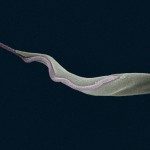Lien vers Pubmed [PMID] – 12476489
Curr. Drug Targets Immune Endocr. Metabol. Disord. 2002 Oct;2(3):247-54
The protozoan parasite Trypanosoma cruzi, causative agent of Chagas’ disease, is transmitted to man and other mammals by triatominae insects, or ‘kissing bugs’. Since its discovery in 1909, by Carlos Chagas, this parasite has been the object of several publications in the domains of immunology, cellular biology and of control gene organization, regulation and expression. Although much progress has been made concerning prophylaxis of Chagas’ disease, particularly vector eradication, additional cases of infection and disease development still occur every day throughout the world. Whilst infection was largely limited in the past to vector transmission in endemic areas of Latin America, its impact has increased in terms of congenital and blood transmission, transplants and recrudescence following immunosuppressive states. Reports on new insect vectors adapted to the parasite and domestic animals infected in more developed countries, emphasize the continuing worldwide public health issue. Therapy against this parasite is limited and cure is subjected to several criteria, such as susceptibility of the parasite strain, age of the host and stage of the disease. The ability of Trypanosoma cruzi to induce important and various host immune system dysfunctions makes the development of effective vaccines a laborious and complex task. These considerations strengthen the latent significance of Chagas’ disease and encourage the search for new preventive procedures and the research on rational vaccines.
